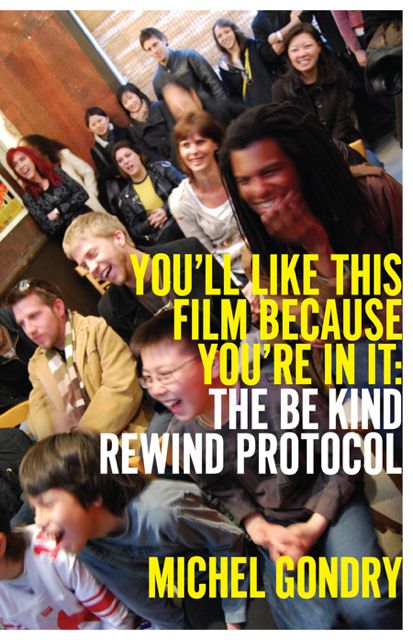
Ain't It Cool News (www.aintitcool.com)
Movie News
Michel Gondry Breaks Down The BE KIND REWIND PROTOCOL For Mr. Beaks!

Michel Gondry has a utopian vision, and you're a part of it. In short, he sees a future in which communities will come together to create cinema. But here's the thing: it doesn't matter if the finished product is good or bad; it just matters you make it.
Hence the title of Gondry's manifesto: YOU'LL LIKE THIS MOVIE BECAUSE YOU'RE IN IT: THE BE KIND REWIND PROTOCOL. It's a thin, seventy-nine-page tome in which the director of ETERNAL SUNSHINE OF THE SPOTLESS MIND a) works through the convoluted thought process that inspired this peculiar project, and b) lays down the rules so that you and your neighbors can try it for yourself. Don't have a DV camera? Not to worry: you can write to Gondry via his website, and, if he thinks you're serious about following the protocol, he just might lend you one to carry it out.
How to convince him you're serious? Easy. Tell him the movie won't end up on the web. Assure him you won't sell it. Stress that you will not accept any corporate money to complete the project. Then maybe you'll get your camera.
In other words, this is not "Michel Gondry's Film School in a Book". He's not looking to create a new movement of independent filmmakers; mostly, he's trying to liberate people from the studio system. Though there are various, semi-contradictory aims stated in the book, Gondry believes that people can derive as much enjoyment from the production and viewing of a fifteen-minute amateur film as they can from passing over $11 to watch a movie lazily slapped together by uninspired industry drones. In a way, he's advocating for the 21st century version of community theater: the process is to be as much fun as the performance, and the performance is to have a finite reach. It is for your friends and neighbors, not for some stranger mindlessly searching for Katy Perry videos on YouTube.
To ensure that the protocol is not used as a gateway to Hollywood, Gondry has imposed a time limit on the inception and production of the video. The participants are to execute a series of tasks, each more difficult than the last, which will result in the completion of a short film. To discourage preciousness, Gondry repeatedly insists that "imperfection is your ally"; again, the purpose of the protocol is that you finish it. Whether your friends' films are better than yours shouldn't matter; after all, you're all amateurs.
As with all utopian visions, there are myriad ways for the protocol to fail. But Gondry is pressing on with it. He'll soon take the gallery version of the project to Brazil (after debuting it to mixed reviews in New York City last February - though it was probably better received than the professional feature film, BE KIND REWIND, that partially inspired it), and then to other cities around the world. From there... well, that's up to you. Need a little more information? Perhaps my freewheeling phone conversation with Gondry from last week will get you interested. Or maybe it'll just add to the confusion. It wouldn't be Gondry if both sensations weren't being induced concurrently.
Readers Talkback
